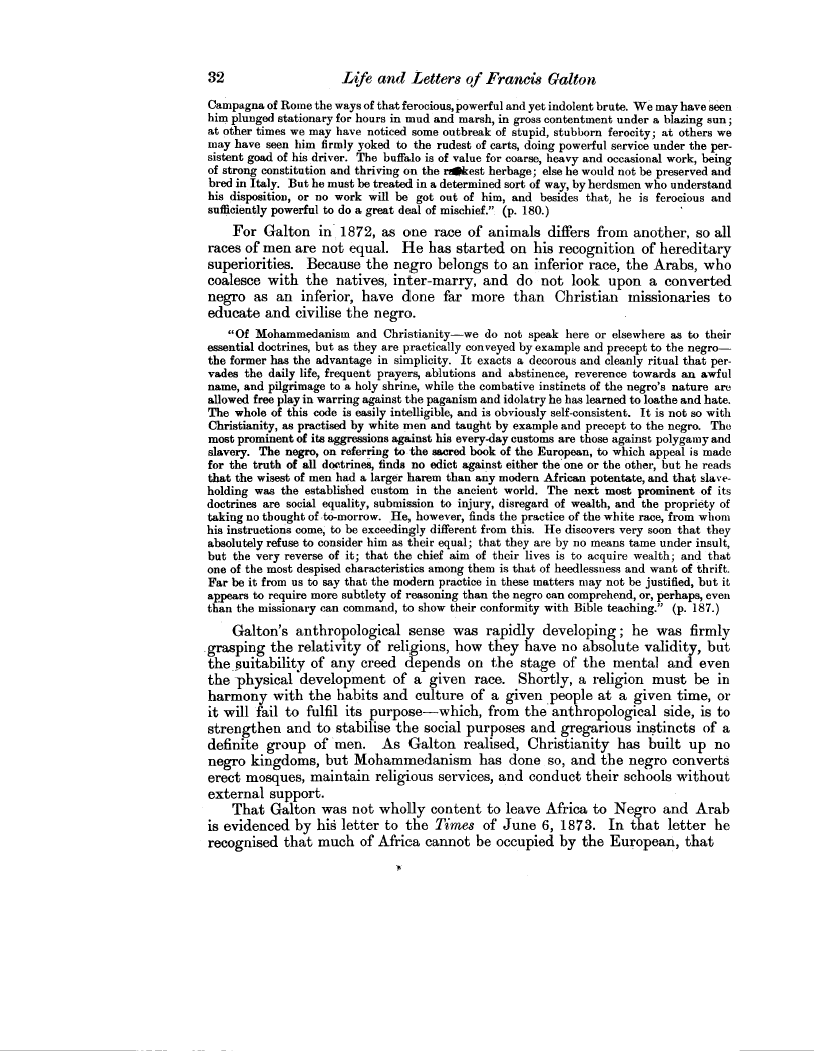32 Life and Letters of Francis Galton
Campagna of Rome the ways of that ferocious, powerful and yet indolent brute. We may have seen him plunged stationary for hours in mud and marsh, in gross contentment under a blazing sun; at other times we may have noticed some outbreak of stupid, stubborn ferocity; at others we may have seen him firmly yoked to the rudest of carts, doing powerful service under the persistent goad of his driver. The buffalo is of value for coarse, heavy and occasional work, being of strong constitution and thriving on the ra*kest herbage; else he would not be preserved and bred in Italy. But he must be treated in a determined sort of way, by herdsmen who understand his disposition, or no work will be got out of him, and besides that, he is ferocious and sufficiently powerful to do a great deal of mischief.". (p. 180.)
For Galton in 1872, as one race of animals differs from another, so all races of men are not equal. He has started on his recognition of hereditary superiorities. Because the negro belongs to an inferior race, the Arabs, who coalesce with the natives, inter-marry, and do not look upon a converted negro as an inferior, have done far more than Christian missionaries to educate and civilise the negro.
"Of Mohammedanism and Christianity-we do not speak here or elsewhere as to their essential doctrines, but as they are practically conveyed by example and precept to the negrothe former has the advantage in simplicity. It exacts a decorous and cleanly ritual that pervades the daily life, frequent prayers, ablutions and abstinence, reverence towards an awful name, and pilgrimage to a holy shrine, while the combative instincts of the negro's nature are allowed free play in warring against the paganism and idolatry he has learned to loathe and hate. The whole of this code is easily intelligible, and is obviously self-consistent. It is not so with Christianity, as practised by white men and taught by example and precept to the negro. The most prominent of its aggressions against his every-day customs are those against polygamy and slavery. The negro, on referring to the sacred book of the European, to which appeal is made for the truth of all doctrines, finds no edict against either the'one or the other, but he reads that the wisest of men had a larger harem than any modern African potentate, and that slaveholding was the established custom in the ancient world. The next most prominent of its doctrines are social equality, submission to injury, disregard of wealth, and the propriety of taking no thought of .to-morrow. He, however, finds the practice of the white race, from whom his instructions come, to be exceedingly different from this. He discovers very soon that they absolutely refuse to consider him as their equal; that they are by no means tame under insult, but the very reverse of it; that the chief aim of their lives is to acquire wealth; and that one of the most despised characteristics among them is that of heedlessness and want of thrift. Far be it from us to say that the modern practice in these matters may not be justified, but it appears to require more subtlety of reasoning than the negro can comprehend, or, perhaps, even than the missionary can command, to show their conformity with Bible teaching." (p. 187.)
Galton's anthropological sense was rapidly developing ; he was firmly .grasping the relativity of religions, how they have no absolute validity, but the_ suitability of any creed depends on the stage of the mental and even the -physical development of a given race. Shortly, a religion must be in harmony with the habits and culture of a given people at a given time, or it will fail to fulfil its purpose-which, from the anthropological side, is to strengthen and to stabilise the social purposes and gregarious instincts of a definite group of men. As Galton realised, Christianity has built up no negro kingdoms, but Mohammedanism has done so, and the negro converts erect mosques, maintain religious services, and conduct their schools without external support.
That Galton was not wholly content to leave Africa to Negro and Arab is evidenced by his letter to the Times of June 6, 1873. In that letter he recognised that much of Africa cannot be occupied by the European, that

